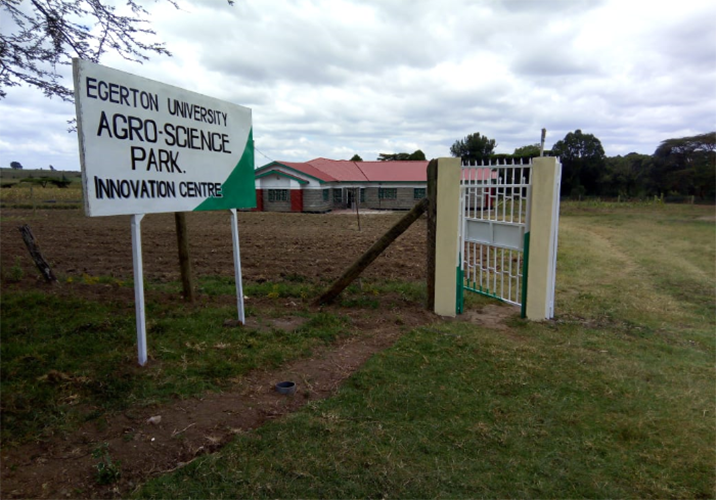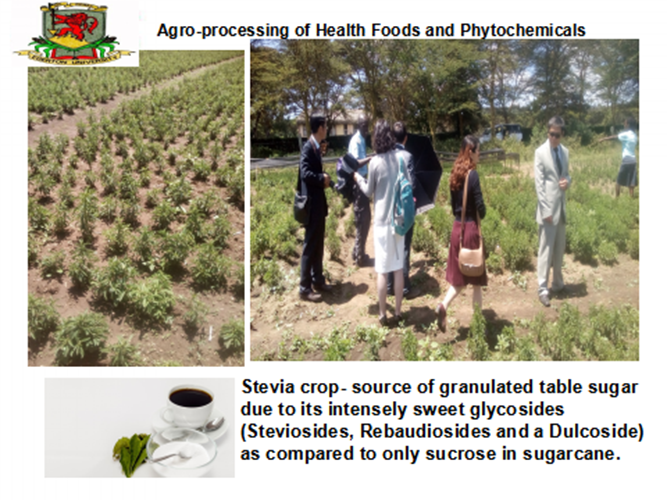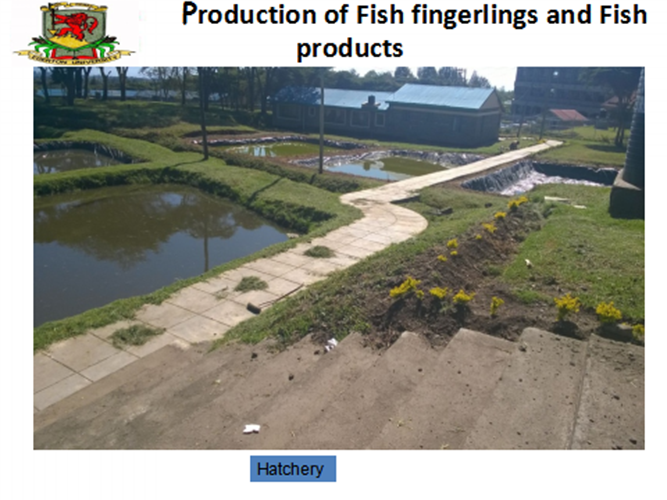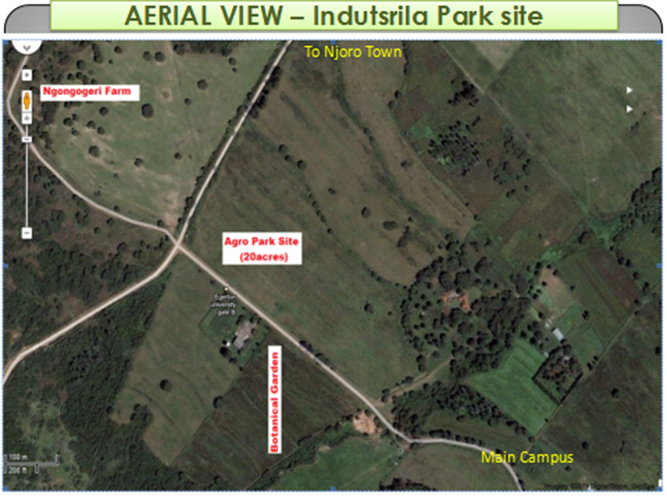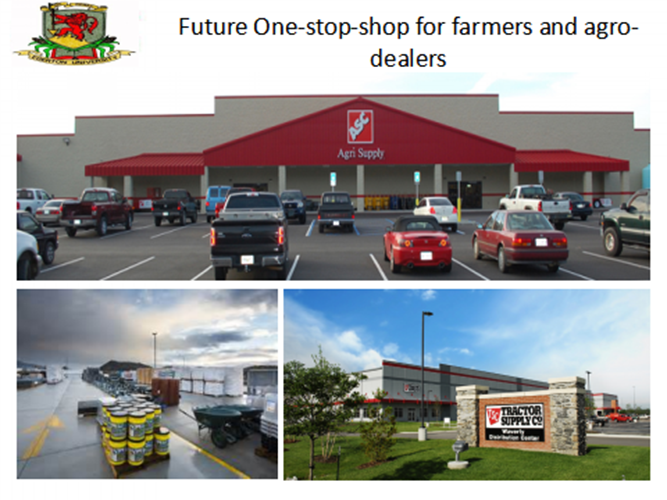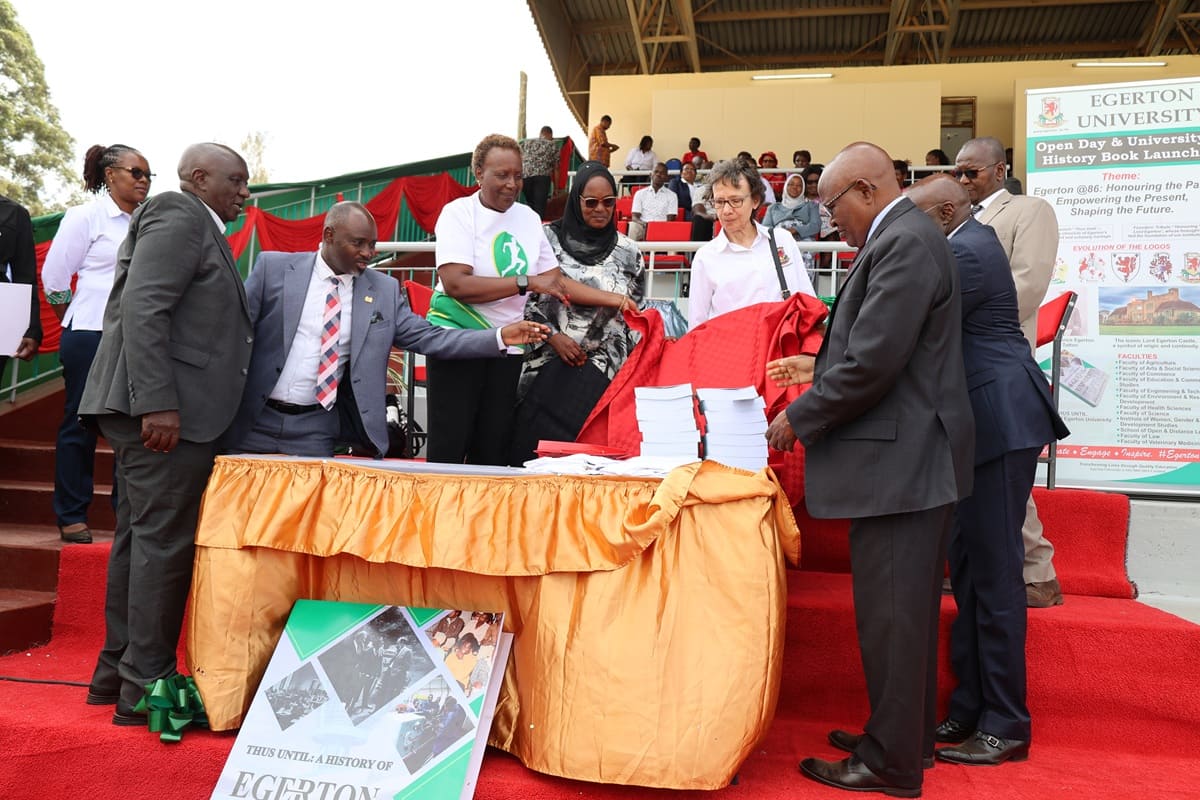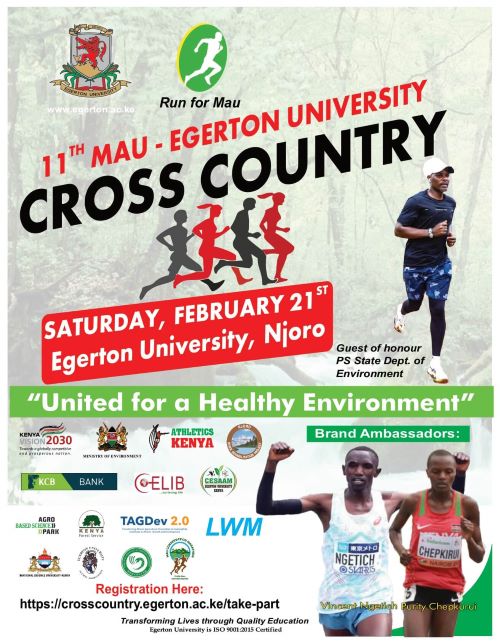Management of Agroscience Park
Agroscience Park is headed by Director with strong advisory team from Agropark Steering Committee consisting of DVC Research and Extension (R&E)), Director of Research and Senior members of Academic, Faculties and Directorate of Planning who are both involved in research and Innovation. The Directorate also gets support from administrative staff and several technical expertise from technicians and interns support from participating departments.
Paul Kimurto is the Founding Director of Agroscience Park since November 2017. Prof Kimurto is an Associate Professor at Egerton University, Faculty of Agriculture and currently the Director of Agro-Science Park (GOK, Vision 2030 Flagship Project) and Head of Egerton University Seed Unit and Team Leaders Seeds of Gold communication Platform. He has over 15 yrs experience in academia and research. He is a Professionally Dryland research and drought stress Physiology/Breeding specialist with enormous experiences in dryland development and validation of breeding and variety development techniques, Application of molecular breeding techniques, Irrigation, fertility and water use and management and seed systems in ASALs, Training and curricula development, scientific writing and reporting. He has attended several International courses offered by ICRISAT, CIMMYT, Generation Challenge Program-GCP, International Atomic Energy Agency (IAEA), IFS, BECA/ILRI and Germany-DAAD in breeding, Genetics, Application of molecular breeding techniques, Bio-Saline and Drought Technology and Seed systems. He hold a PhD in Crop Science (Crop Physiology/Breeding), and a Master of Science in Crop Science & a BSc in Agriculture. He has authored/co-authored over 20 papers in refereed journals and over 50 Conference proceedings in various fields. production, Application of biotechnology and molecular breeding in Agriculture, climate change resilience, modeling among others. He is/has been supervisor of several Msc.& PhD Students in local and other universities. He has won several grants in research in development of resilient high yielding crop varieties of Beans, Chickpea, Finger millet, wheat, Sorghum funded by several International Donors like Gates Foundation AGRA, CIAT, ICRISAT etc. Currently involved in FAO drought resilient activities in Turkana and West Pokot Counties funded by IKEA foundation.
THE DIRECTORATE OF AGRO-SCIENCE PARK
AgroScience Park (AgroPark) is Directorate under the Division of Research and Extension established in 2011 as a Vision 2030 Government Project to employ STI to move technology out of the lab and into the marketplace. The Agro-Science Park is one othe Vision 2030 Flagship projects together with Rehabilitation of Njoro River and Chemeron Dryland Eco-Tourism and Training centre. The Park is University's Unit which its main goal is to entrench the need to develop education, science, technology and innovation in thus contributing to knowledge-based economic development of the country. By creating new business opportunities and value addition the Park would spur rapid national development in fulfilment of Vision 2030 objectives. The overall mandate of promotion of innovations, products and services to be commercialized and linking university with industry for uptake of this products. Envisioned in long run to brings together academic, farmers, graduate students, business, agro-procesors and manufacturers in one stop-shop to share information and innovative ideas, commercialization and wealth creation. The Park is located beside the Ngongongeri Farm of Egerton University and facing the magnificent University Botanical Garden. The Park owns 50 acres of land for demonstration facilities and meeting point with farmers, private sector. The park has the following strategic activities are: providing infrastructure for incubating Agro-innovation fro private and public sector partners; encourage and facilitate strategic partnerships in the agro-value chains development; facilitating incubation and Start-ups through stimulating and managing the flow of knowledge and technology between universities and companies and communication between companies, entrepreneurs and technicians and providing environments that enhance a culture of innovation, creativity and quality; Commercialization of innovations in partnership with the Industry; facilitate the creation of new businesses via incubation and spin-off mechanisms, and accelerate the growth of small and medium size companies focusing on companies and research institutions as well as on people: the entrepreneurs and ‘knowledge workers' and lastly resource mobilizing and generating resources to sustain the Park. Work in a global network that gathers many thousands of innovative companies and research institutions throughout the world, facilitating the internationalisation of their resident companies
In 2019, the National and County Government of Nakuru proposed to upgrade the Park into an a national Agro-industrial Park which doubles as Special Economic Zone (namely, Lord Egerton Agri-City) on 200 acre land within its 3000 acre Ngongongeri farm.
Conception framework
The industrial park is conceptualized to be a Regional agro-hub as shown in Fig 1. The Park will be cluster for agro-development, manufacture, marketing and distribution of quality agricultural inputs, ingredients, produce, goods and services with World class agriculture and industrial university that is bedrock of extension, economic modelling and policy development; Global center of excellence in African crop seed and animal genetics; Farm inputs and machinery manufacture and distribution; Food production, produces trading and agro-processing; Special Economic Zone & Freeport and heavenly living environment with modern amenities.
Major Special Economic Zones
The special economic zones to be designated as a Multiple Sector economic zones to can cover the following sectors: Science and Technology Park (to facilitate the science and technology sector), Agricultural Zone (to facilitate agricultural sector and relates activities and services), Business Service Park (to facilitate provision of services, BPOs, call centres, management consulting, advisory services and other associated services) and Agro-Industrial Park (integrated infrastructure to facilitate manufacturing and processing industries).
Special Economic Zone Authority Operation licensing
The Park is proposed to attract private sector partners who operate as Operator Licence (as corporate entity engaged in the management of a special economic zone), Developer Licence (as corporate entity engaged in developing and operating a special economic zone and Enterprise Licence (as corporate entity carrying out business in a special economic zone in partnership with investors). IFC/World Bank funded the Pre-feasility studies of Lord Egerton Agro-City together with 2 other Industrial parks in Kenya (Naivasha Special Economic Zone, Kisumu Special Economic Zone). The findings indicated that Lord Egerton Agri-City has potential for dairy and horticulture Agro-processing, Incubation and Start-ups, Research Institutes, Reference labs, R&D centres of international companies, agro-food systems, Bio-based products, and healthy living environment.
Progress and notable achievements
Since inception 10years ago, Agro-Park notable achievements include;1) Release and commercialization of high yielding crop varieties of beans (Chelalang, Tasha and Ciankui), groundnuts (Nyota and Mwangaza), Sorghum (EUS1), finger millets (Snapping green), chickpeas (Saina ka1) and pigeon peas (Egerton Mbazi M1, Mbaazi M4 and Mbaazi M3) for farmers in Kenya through KEPHIS and seed industry. These varieties for which are recommended for farmers in low and medium of Kenya; 2) Commercialization of Egerton University Organic Honey and Yoghurt with Kenya Industrial Property Institute (KIPI), and KEBS Standardization Mark of Quality Certificate for Egerton University – HONEY through Agro-Food Industry and Nutritional Products Centre (AFINPC) from Dairy plant of Dairy and Food Science Department; 4) Establishment of Finger links production Unit for the supply of finger links to farmers thus enhancing Fish Farming in Kenya 5) Enhancing mechanization by fabrication of shellers and motorized small machines.
Management of Agroscience Park
Agroscience Park is headed by Director with strong advisory team from Agropark Steering Committee consisting of DVC Research and Extension (R&E)), Director of Research and Senior members of Academic, Faculties and Directorate of Planning who are both involved in research and Innovation. The Directorate also gets support from administrative staff and several technical expertise from technicians and interns support from participating departments.
Vision
To be a centre of excellence in the generation and transformation of innovations into products and services for a prosperous agro-industrial growth.
Mission
To foster intensified application of Science, Technology and Innovations (STI) in agro value chains development.
Objectives
- To increase generation of innovations through Science and Technology.
- To build and equip infrastructure for incubating innovations.
- To encourage and facilitate strategic partnerships in the Agro Value Chains development.
- For facilitate commercialization of innovations.
- To mobilize and generate resources to sustain the Agro-Park.
Core Values
Innovation
We adapt and utilize the latest appropriate technology and practices
Professionalism
We maintain high standards in the discharge and delivery of services
Transparency & Accountability
We uphold openness and demonstrate responsibility in our work.
Integrity
We uphold honesty and strong moral principles in all endeavors.
Keys to Success
- Egerton University has a long tradition of agricultural training and research in the region. It is a premier agricultural public University in the region.
- Egerton University has the critical mass of agricultural experts that will turn the wheel of agricultural based STI innovations into products and services.
- The Agro-Based Science Park has the necessary facilities to conduct research and offer extension services. Available resources include office space, research laboratories, land, machineries, processing equipment, research fields, and so on.
- The Agro-Based Science Park receives the full support of the University towards implementation of its objectives. Being the Division of Research and Extension flagship project, it is strengthened by the financial and human resource support it receives.
- Being in a strategic location, the University and the Park are easily accessible by road and air transport.
Departments and/or Sections
The Park provides incubation space and infrastructure for nurturing agricultural based innovations into products and services for commercialization. Once fully operational The Park will be composed of four broad and closely inter-connected Centres namely the Incubation Centre, Industrial and Commercialization Centre, Training and Service Centre and the Research and Innovation Centre. The Incubation Centre will act as a business incubator by facilitating new and start-up companies to develop through provision of services such as management training or office space. It will also act as a catalyst tool for either regional or national economic development. The Industrial and Commercialization Centre will host several agro-processors dealing with different value chains at different levels. This will provide an opportunity for subsistent food value chains to grow to commercial as well as encourage the development of new products. New and improved products can be developed and effectively market tested within the Park. The Training and Service Centre will be where the different stakeholders can be trained on various topics that are relevant to their roles in the park and outside. For instance farmers and agro-processors trainings. Ultimately the Research and Innovation Centre will be the driver of the AIP and will be expected to develop technologies and innovations aimed at increasing agriculture productivity and enhancing value chain development through improved agro-processing.
These for broad Centres will be further be divided into 8 key units/centres which include: Agri-Business Incubation Centre (ABI) and Start-up Centre; Agro-Biotechnology Innovation Centre (ABIC), Seed Unit and Variety Development Centre (SUVDC); Herbal Medicine and Bio-Chemical Products Centre (HMBC); Animal-Agro-Food Industry and Nutritional Products Centre (AAFINPC); Engineering and Renewable Energy Centre (EREC); Bio-informatics and Computational Genomics Centre (BCGC) and Conference Centre.Additionally, other services like banking, storage, transport, preservation and insurance will be provided within the park through the training and service centre.
Functions, Activities and/or services offered.
The following are sector specific products and servives to be offered mainly in Agriculture and farm sector, Agri-engineering, Agri-infrastructure, Agri-industry and food processing, capacity building, skill development & training Agri-logistics and related amenities including rural financing, agr-tourism, and renewable energy:
Training and Capacity Building
- Training of farmers on agronomic practices for new and existing products.
- Training of farmers on nutrition and health benefits of new products.
- Training of staff from other organization on crop management practices.
- On-site training on fish production and feed formulation.
- Organizing farm trainings on crucial pond management practices.
- Training of students and pupils on new crop varieties and development process.
- Equipping students with knowledge on organic honey production.
- Training of farmers during field days, shows and exhibitions.
- Training on soil and water conservation based on new crop varieties and intercropping.
- Training on food safety standards, post-harvest handling, and proper packaging.
- Training of stakeholders on new and affordable methods of yoghurt production and packaging for the local market.
Research Consultancy
- Partnering with like-minded institutions on areas of research and development such as FAO, KALRO, USAID, World Bank, ICRISAT, AGRA, and Kilimo Trust.
- Development of strategic plans for Agro-Based enterprises.
- Development of business plans for Agro-Based organizations.
- Conducting feasibility studies for farmers interested in setting up enterprises.
- Organizing tour services for farmers and individuals in various farms.
- Conducting farm clinics and farm visits in collaboration with stakeholders.
- Conducting joint extension services in collaboration with Ministry of Agriculture.
Short Courses and Field Attachment
- Organizing short courses on seed production and handling.
- Organizing short courses on fish production and feed formulation.
- Organizing short courses on organic honey processing and packaging.
- Organizing short courses on yoghurt production and packaging.
- Organizing short courses on mushroom spawn production, commercialization of mushroom and proper packaging and handling of product.
- Linking students and staff to potential areas of interest in agriculture.
- Offering students field attachment and internship services on monthly basis.
Office Contact info (Phone & Ext No.(s), Email(s) and location
Email: agroscience.park@egerton.ac.ke, egertonseedunit@yahoo.com, pkimurto@egerton.ac.ke
Location: CMRT Building, 2nd Floor Eastern Wing, and The New Agro-Science Park Complex opposite Botanical Garden.
